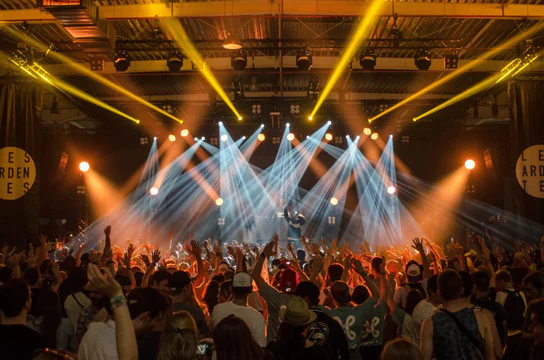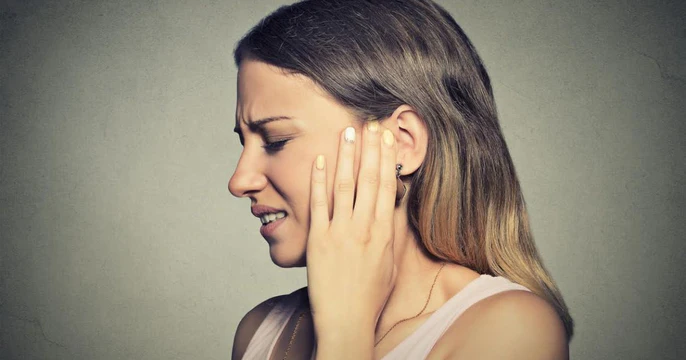Key takeaways
- The noise levels in a club can reach 120 decibels.
- Exposure to sound levels above 70 decibels can cause irreversible damage to your hearing.
- The noise levels in a club can reach 120 decibels.
- There are ways to help your ears stop ringing after going to a club, which can include things like meditation, exercise, white noise and listening to ambient music at a low level.
If your ears are exposed to loud music, protect them with noise-reducing earplugs. These not only provide the ultimate protection but can also enhance your experience.
What. A. Night.
Music was pumping. Drinks were flowing. Dancing went on till the early hours.
And now? Time for bed.
But hold up, it’s that damn noise again.
“rrrrriiiiiNNNNNGGGGG”
That high-pitched ringing in your ears is back.
And it seems to happen every time you leave a club.
If you find your ears ringing after loud music, chances are you’re experiencing tinnitus.
Tinnitus is a common sensation that affects between 15-20% of the population. It most commonly presents itself as a ringing sound in your ears. But that sound can also extend to other noises such as rushing or whistling.
And for those who frequently listen to loud music, this can become a problem.
The thing is, dancing to loud music can be a powerful stress-reliever, a chance to escape the world, and let’s be honest, it just sounds better played loud!
But while that’s all true, the fact remains: your ears are at risk.
In this article we’re going to look at how to stop your ears from ringing after clubbing, how long the ringing lasts and what you can do to relieve the symptoms.
Let’s get started.
What is tinnitus?
Have you ever experienced a ringing sensation in one or both of your ears?
Sounds like tinnitus.
The most common sounds you’ll hear can include:
- Ringing
- Whooshing
- Clicking
- Humming
- Throbbing
- Hissing
- Roaring
- Music or singing
These noises can vary in pitch, can be constantly present, or can come and go. You may hear them in one or both ears (or even in your head). And when they’re accompanied by a muffled or “dampened” sound, this can often indicate noise-induced hearing loss.
Symptoms of tinnitus
There is no “one size fits all” for how tinnitus can affect a person.
For some, it can be a fleeting experience lasting for only a number of hours. While for others it can last a lot longer (even a lifetime), resulting in serious social and psychological distress.
Some long-term effects of tinnitus can include:
- Sleep problems
- Trouble concentrating
- Anxiety and irritability
- Headaches
- Fatigue
- Stress
- Memory issues
- Depression
- Problems with family and work life
What causes the ringing in my ears?
Did you know you’re born with around 16,000 hair cells in your ears?
Yep, your ears are complex little things.
These tiny, delicate hairs in your inner ear (cochlea) vibrate when they come into contact with a sound wave.
When the hairs are triggered, they send an electrical signal through the auditory nerve to your clever brain, where it is then interpreted as sound.
When exposed to loud sounds, these little hairs can become damaged and then die. And once gone? Unfortunately they don’t regrow.
Constant exposure to loud noise results in more hairs being damaged. This means your ears are less capable of signaling sound to your brain, affecting your ability to hear.
How loud is too loud?
Clubs are fast-paced, fun-filled places.
That’s why we love them.
And amidst the chaos, it’s easy to forget how the volume may be affecting your ears.
But exactly how loud is too loud?
Let’s use decibel levels as a frame of reference.
Here are some noise level examples:
- 10 decibels: Sighing
- 65 decibels: A normal conversation
- 80-90 decibels: Busy city traffic
- 100-120 decibels: A nightclub
- 140 decibels: A plane taking off
- 180 decibels: A rocket launch
The sound levels in a nightclub can reach 120 decibels.
Now consider that your ears are at risk from exposure to noises of 70 decibels and above.
At 90 decibels ear damage is possible after two hours.
At 100 decibels, ear damage is possible after just 30 minutes.
And at 120 decibels (the average nightclub noise level), you can damage your ears after just 15 minutes of exposure.
Scary, right?
How long will the ringing last?
Temporary tinnitus is a thing.
The good news? It usually disappears over a period of 16-48 hours. In some cases, a week or two.
Remember those little hairs in your ears?
In these cases they’ve been temporarily bent by the noise. But given time to recover, they will become straight again and your hearing will return to normal.
And the bad news? When they’re repeatedly bent and put under stress, they’re likely to become weak or break, resulting in varying degrees of ear damage.
The hard truth is that the more damage inflicted, the further down the road you are on the way to permanent damage including long-term tinnitus, and at worst, hearing loss.
And it’s a growing problem.
Hearing loss is predicted to rise dramatically among younger people in the near future. Read more about this here.
How to stop ears ringing after clubbing
There’s no doubt that tinnitus can be a frightening experience. But there are some things you can do to help alleviate the symptoms.
Tip #1 TRY TO RELAX
Stress often goes hand in hand with tinnitus.
Try practicing breathing techniques, or fit some exercise into your daily routine. Bear in mind that not all exercise will help. Avoid high impact if you can. Yoga or pilates is ideal and will work to alleviate your tinnitus symptoms.
Tip #2 PLAY WHITE NOISE
During a busy day there’s enough going on to distract you from the noise. But at quiet times the ringing may be more noticeable.
White noise can help to mask the ringing in your ears.
Here’s a free YouTube playlist to get you on the right track.
Tip #3 AVOID SMOKING
Sound waves are interpreted by your brain.
Cigarettes are a stimulant that can harm the blood flow to sensitive nerve cells in your brain. Which could actually cause your ears to ring louder than they already do!
Tip #4 TRY HEAD-TAPPING
This head-tapping technique can help to reduce the ringing of tinnitus.
It involves these simple steps:
- Cover your ears with your palms and rest your fingers at the base of your skull.
- Keeping your ears covered with your palms, raise your index fingers and gently tap the back of your head. You’ll hear a sound a bit like a gentle drum.
- Lightly tap around 50 times. Repeat as necessary for relief.
Tip #5 PLAY LOW-VOLUME MUSIC FOR RINGING IN THE EARS
Over the years, research has resulted in huge breakthroughs for people with tinnitus.
Studies have revealed that ambient music can help reorganize the auditory cortex (the part of the brain that perceives sound). This will make it super effective at masking the effects of tinnitus.
There are a whole host of tinnitus playlists online. We like this soothing playlist on Spotify; give it a try for some much-needed relief.
Tip #6 DISTRACT YOURSELF
Do something fun to take your mind off it.
Stick on a podcast or some soothing, quiet music. But remember to only listen at a safe volume to avoid any further ear damage.
Tip #7 LIMIT ALCOHOL AND CAFFEINE
Booze and coffee both have stimulant effects.
These sorts of stimulants can affect blood flow, especially when taken in excess. When your blood flow is affected it can contribute to tinnitus.
How can I prevent ringing in my ears?
No matter what stage of hearing damage you find yourself in, it’s always a good idea to protect your hearing.
Remember, even if the ringing disappears, it doesn’t mean you’re out of the forest. Further loud sound exposure can lead to more damage.
Here are some ways you can protect your ears:
- Invest in noise-reducing earplugs
What if we told you that earplugs can actually enhance your experience?
It’s a fact. Earplugs like Loop Experience are the ideal earplugs for clubbing.
Loop Experience earplugs feature a cleverly designed acoustic channel and mesh filter that result in a noise reduction of up to 18 decibels, whilst still allowing you to hear everything crystal clear. No dampening of sound. No muffling. Maximum comfort.
They look great too. With various different colors to choose from to go with your outfit.
So you can keep on doing what you love while at the same time protecting your ears.
Loop Earplugs
Experience 2
Share
- Turn down the volume
Whatever you do, keep the volume low. And that doesn’t just go for music.
Avoid anywhere super loud for a while. A little rest will work wonders, and your ears will thank you.
- Take a break
If your ears are already ringing from loud music, listen to your body and make time to give your ears a rest.
Find the club chill-out room, or stand outside for a few minutes. Even a five-minute break can help your ears and prevent hearing damage.
- Check out the noise levels
Apps like dB Volume Meter and DeciBEL can help you monitor the noise levels from your phone. If you find the volume is over 80 decibels then move to a quieter area.
And there you have it.
While clubbing is super fun, your ears deserve to be protected.
If you find your ears are ringing after clubbing, think of it as your body giving you a warning.
It doesn’t mean that you have to give everything up.
Just get smart about how you do it.

Unveiling the Top 5 Causes of Tinnitus
Discover the top 5 causes of tinnitus and gain insights into why your ears ring. Expert advice for identifying trigge...

How to Stop Ringing Ears After a Concert
If you’ve landed on this article, there’s a pretty good chance you’re hearing a ringing in your ears while reading th...

How to prevent tinnitus and protect your ears
Prevention is the best cure, right? And when it comes to tinnitus, properly protecting your ears can go a long way to...





























